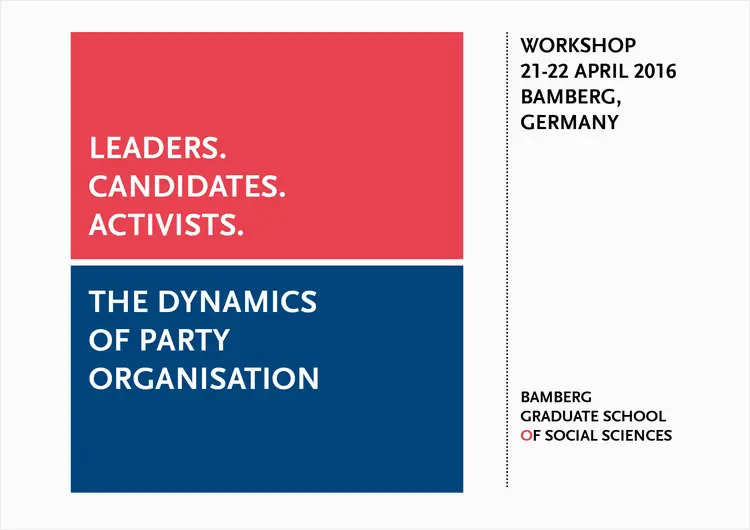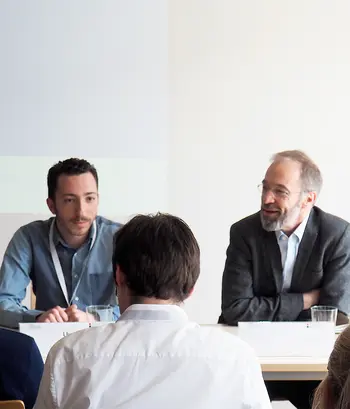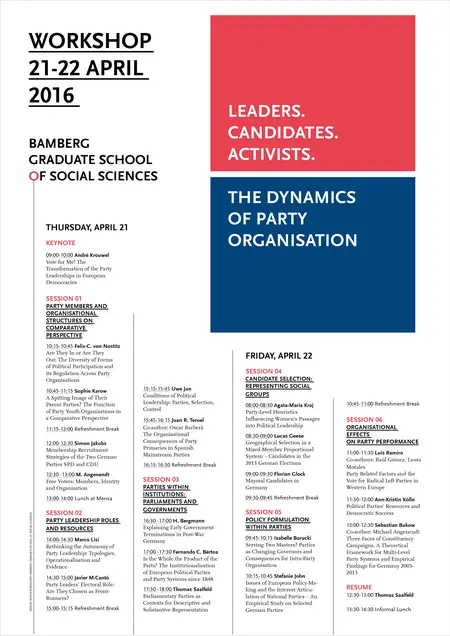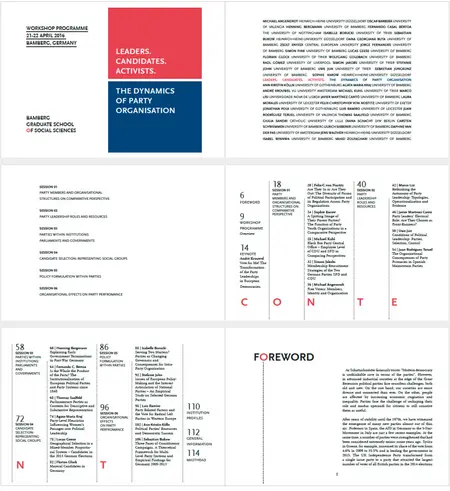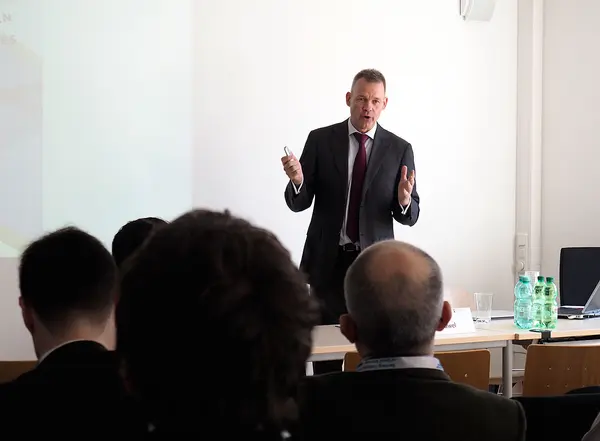RESEARCH WORKSHOP ▼
LEADERS. CANDIDATES. ACTIVISTS.
The Dynamics of Party Organization
___ Workshop Concept
▐ Political parties are important links between civil society and state. Changes in the structure of societies and states have had strong implications for political parties. New parties have emerged, others disbanded. Yet others sought to adapt their organizations to an ever-changing social, economic and political environment. It is therefore necessary for the scholarly community in this area regularly to take stock of the state of research on party organizations, jointly to identify emerging themes and share results of recent research.
The workshop was designed to bring together experts from Europe and beyond to discuss recent challenges and developments in the field of party organization and to give young emerging scholars an opportunity to engage in formal and informal discussions with senior scholars. The format differed from traditional workshops in the sense that we resisted the temptation either to pre-arrange a specific programme or to send out a general call for papers. Instead, we were keen for invited experts to discuss their assessments of the state of the (sub-)discipline as it is reflected in their own research priorities.
........................................................................................................................................................
___ Thematical Framework
▐ As Schattschneider famously wrote: "Modern democracy is unthinkable save in terms of the parties". However, in advanced industrial societies at the edge of the Great Recession political parties face countless challenges, both old and new.
On the one hand, our societies are more diverse and connected than ever. On the other, people are affected by increasing economic stagnation and inequality. Parties face the challenge of reshaping their role and modus operandi for citizens to still conceive them as useful.After years of stability until the 1970s, we have witnessed the emergence of many new parties almost out of thin air: Podemos in Spain, the AfD in Germany or the 5-Star-Movement in Italy are just a few recent examples.
At the same time, a number of parties were strengthened that had been considered extremely minor some years ago. Syriza in Greece, for example, increased its share of the vote from 4.6% in 2009 to 35.5% and is leading the government in 2015. The UK Independence Party transformed from a single issue party to a party that attracted the largest number of votes of all British parties in the 2014 elections to the European Parliament. The French Front National and the Sweden Democrats are further cases in point. Conversely, other parties have passed from a preeminent role to a marginal position like the Greek PASOK or the Italian Forza Italia or Democrazia Cristiana. The increasing electoral volatility all across Europe is forcing parties to reshape their link with their grassroots, voters, the state and the citizens. Some parties have opted for enabling more actors to decide on their candidates and policies. The German and Spanish social democrats asked their members about draft coalition agreements before they joined the respective coalition governments. While this may still be extraordinary, party primaries for candidate selection have passed from being the exception to almost the rule. For instance, the British Labour Party, the French Socialists and the Italian Democrats consulted citizens when selecting their candidates for top positions.
Meanwhile new parties seem to emerge whose organisation seems to empower their grassroots and simultaneously revolve around a charismatic personality that seems to embody the party. Some of them, such as the 5-Star-Movement and Podemos, also encourage new ways of participation though online tools that challenge the traditional role of party members.The scholarly community needs to take note of these changes and frame them in the bigger picture.
It is therefore necessary for scholars in this field to regularly take stock of the state of research on party organisations, jointly to identify emerging themes and share results of recent research. This workshop serves as a platform to discuss recent challenges and developments in the field of party organisation. For this purpose, participants will discuss, amongst other topics: the role of current party leaders, minority representation and candidate selection, how parties formulate policies, the changing role of party members and the structures that shape them, how parties act within institutions and how they campaign. Additionally, this workshop is an opportunity to give young emerging scholars a chance to engage in formal and informal discussions with senior scholars as well as with one another and to build interpersonal bonds. ◼
........................................................................................................................................................
___ Guests and Participants
Michael Angenendt, Heinrich-Heine-University Düsseldorf
Henning Bergmann, University of Bamberg
Isabelle Borucki, University of Trier
Sebastian Bukow, Heinrich-Heine-University Düsseldorf
Fernando Casal Bértoa, The University of Nottingham
Lucas Geese, University of Bamberg
Florian Glock, University of Trier
Simon Jakobs, University of Trier
Stefanie John, University of Bamberg
Uwe Jun, University of Trier
Sophie Karow, Heinrich-Heine-University Düsseldorf
Ann-Kristin Kölln, University of Gothenburg
Agata-Maria Kraj, University of Bamberg
André Krouwel, VU University Amsterdam
Marco Lisi, Universidade Nova de Lisboa
Javier Martínez Cantó, University of Bamberg
Luis Ramiro, University of Leicester
Thomas Saalfeld, University of Bamberg
Juan Rodríguez Teruel, University of Valencia
Felix-Christopher von Nostitz, University of Exeter
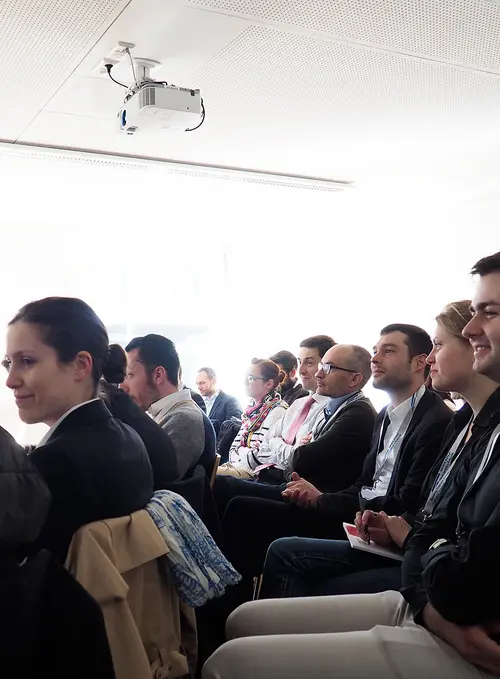
........................................................................................................................................................
___Workshop Programme
Download the programme poster here(53.3 KB, 1 page).
Download the full programme booklet here(4.7 MB, 116 pages).
........................................................................................................................................................
........................................................................................................................................................
___Organizers
Thomas Saalfeld, Chair for Comparative Politics, University of Bamberg
Javier Martínez-Cantó, Doctoral Fellow at the Bamberg Graduate School of Social Sciences, University of Bamberg
Uwe Jun, Professor of Political Sciences, University of Trier
The workshop was organized in collaboration of the Bamberg Graduate School of Social Sciences and the Standing Group "Parteienforschung".
........................................................................................................................................................
MAIN PAGE | CONTACT | LEGAL | PRIVACY POLICY | DATENSCHUTZ | IMPRESSUM
© Bamberg Graduate School of Social Sciences
Image Credits: © Bamberg Graduate School of Social Sciences
